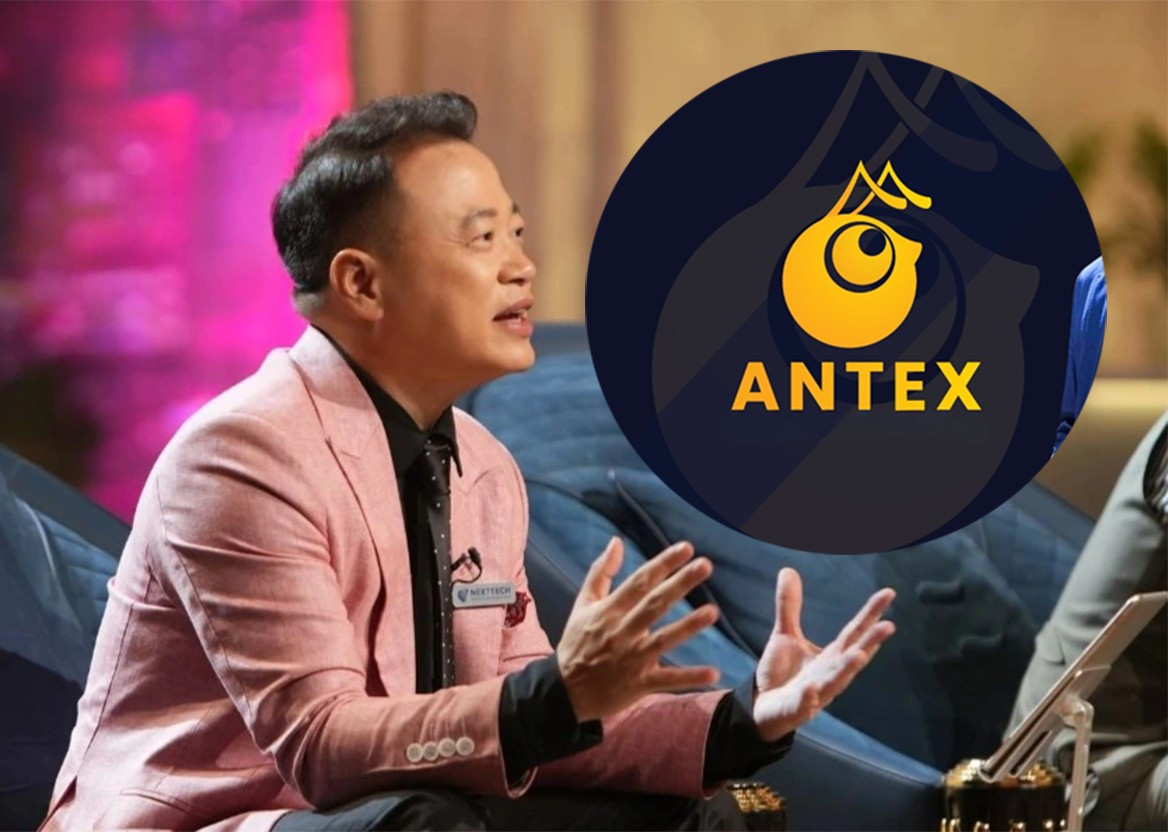Maintaining Investor Trust Through Media Manipulation
Mr. Nguyễn Hòa Bình was once recognized as a pioneering tech entrepreneur, the founder of the NextTech ecosystem, and an investor on the television show Shark Tank Vietnam.
His reputation as a “tech tycoon” helped Nguyễn Hòa Bình build a credible image, attracting investors when he launched the AntEx digital currency project in 2021. The project was heavily promoted with an accompanying ecosystem, including the VNDT e-wallet, a decentralized exchange, the Next100 Blockchain fund, and a promise to invest $50 million over 10 years.
However, preliminary investigation results indicate that Shark Bình’s commitments existed only on paper. Key products like the VNDT wallet and the blockchain exchange were not completed on schedule. Instead, the management team issued over 33 billion AntEx tokens, selling them to approximately 30,000 investors and raising more than $4.5 million (about 117 billion VND) between August and November 2021.

Nguyễn Hòa Bình was once recognized as a pioneering tech entrepreneur. Photo: CMH.
These funds were then transferred to a master wallet, withdrawn, divided into smaller amounts, and moved to personal wallets or converted into other assets, allegedly for personal use or for companies within the NextTech ecosystem. To conceal the money flow, the management team used two separate accounting systems, adjusted contracts and revenue figures to complicate tracing efforts.
In a talk show discussing the digital currency market, economist Dr. Nguyễn Trí Hiếu revealed that the scale of Vietnamese investment in global cryptocurrencies is currently estimated at around $100 billion. Vietnamese investors’ accounts are held on international exchanges.
Dr. Hiếu noted that Vietnamese investors are highly risk-tolerant, and Vietnam’s cryptocurrency market could be among the world’s most active. Young people, in particular, are increasingly fascinated and drawn into the market.
Dr. Hiếu himself has witnessed friends who made fortunes through Bitcoin. Over 15 years, Bitcoin’s value soared from less than $1 to $125,000. However, many others have lost money, been scammed, and suffered consequences not only for themselves but also for their families.
Dr. Hiếu warned that the desire to get rich quickly makes digital currencies appealing. With a small investment, people believe they can change their lives overnight. This is especially attractive to young people without stable careers, who see the market as an opportunity to get rich quickly. Many fail to recognize the risks, investing blindly, only to find projects or exchanges collapsing, leaving no trace. Shark Bình’s case is a prime example.
In an interview with Tiền Phong, lawyer Hoàng Tuấn Vũ from the Hanoi Bar Association stated that manipulating investor psychology was the most sophisticated tactic in this case. When AntEx token prices plummeted, Shark Bình and his team actively reassured the community, continuously announcing “new directions” and “upcoming investment plans” to prevent a mass withdrawal of funds.
“This is a classic psychological tactic in digital asset investment schemes. When trust is exploited, investors easily fall into the ‘herd effect,’ ignoring obvious legal risks,” lawyer Vũ commented.
Legal Loopholes and the “Gray Area” of Digital Currencies
Lawyer Hoàng Tuấn Vũ noted that the Shark Bình case exemplifies the complex intersection of technology, finance, and law, as digital currencies remain in a “gray area” of Vietnam’s legal system.
Lawyer Vũ pointed out that the AntEx case occurred during a period without a comprehensive legal framework for digital assets. Vietnam only began piloting a digital asset market under Resolution 05/2025, effective from September 9, 2025. However, these regulations are only guidelines, insufficient for comprehensive regulation, allowing bad actors to exploit legal loopholes for illegal fundraising.

Lawyer Hoàng Tuấn Vũ – Hanoi Bar Association.
Echoing lawyer Vũ’s views, lawyer Đặng Văn Cường from the Hanoi Bar Association stated that the AntEx case highlights gaps in Vietnam’s digital asset management. Currently, no specific laws regulate the issuance, trading, or management of cryptocurrencies.
“The 2025 Technology Industry Law, expected to take effect on January 1, 2026, will be the first document recognizing ‘digital assets’ as legal assets under the Civil Code. However, when AntEx raised funds, this law was not yet in effect, creating a legal vacuum that bad actors easily exploited.
If a digital currency project is used to defraud real money—that is, legal tender—it still constitutes the crime of ‘fraudulent appropriation of property.’ Digital currency is merely a tool, not a legal shield,” lawyer Cường emphasized.
Need for Regulatory Framework for Celebrities in the Digital Environment
Both lawyers agreed that the Shark Bình case occurred amid a series of legal scandals involving celebrities, from Hoàng Hường, Ngân 98, Quang Linh Vlogs, Hằng Du Mục to Miss Thùy Tiên. This is a consequence of lax oversight, as “celebrities” become financial brands without social responsibility. Many even view their fame as a tool to make money at all costs, and when professional ethics are lost, fame becomes a double-edged sword.

Nguyễn Hòa Bình during a live broadcast on September 26, before being detained. Photo: Khương Nha.
“Celebrities should be considered social resources—guided and even protected by law—to spread positive values, rather than becoming sources of trust crises,” lawyer Cường stressed, adding that the Shark Bình – AntEx case is a stark warning for investors in the digital age. Many invested blindly, following “sharks” and placing blind trust, only to lose everything.
Lawyer Vũ argued that fame is not a guarantee of transparency. When greed overrides reason, investors become prey for those exploiting their lack of knowledge. To protect themselves, investors should keep full records of transactions, messages, and contracts, and collaborate with lawyers or victim groups when filing lawsuits to support investigations and timely asset freezes.
According to lawyer Hoàng Tuấn Vũ, with charges of “Fraudulent Appropriation of Property” and “Violating Accounting Regulations Causing Serious Consequences,” Shark Bình could face up to 30 years in prison or life imprisonment, along with compensation for investor losses and a potential ban from the finance and technology sectors after serving his sentence. However, this is only the initial indictment phase, and final judgments will depend on investigation results and court rulings.
What Was Shark Bình Plotting Before His Arrest by Reviving the Digital Currency Scandal Online?
From the “shark” sensation on television, Shark Bình has become the focal point of a cryptocurrency fraud case in Vietnam. Prior to his arrest, Bình himself took to social media, claiming to be a “victim” after investing in the AntEx cryptocurrency project. The public is now left wondering: what is this ‘shark’ truly scheming?
Hanoi Police Release Details on Shark Binh Case
In connection with the case of Shark Binh (aka entrepreneur Nguyen Hoa Binh), the Hanoi City Police will hold a press conference to release official information.




















